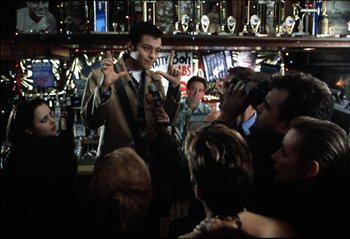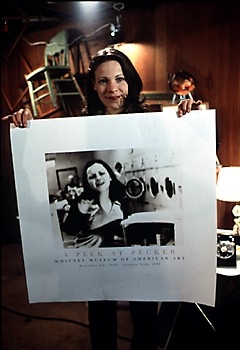![[safe]](safe.gif)

Pecker

Starring Edward Furlong, Christina Ricci, Mary Kay Place, Lili Taylor,
Mink Stole, Martha Plimpton, Brendon Sexton III
Directed by John Waters
![[safe]](safe.gif)


Those unfamiliar with the work of John Waters may well see “Pecker” and wonder what all the hype is. Gone are the days where Waters - the original independent film-maker with a penchant for bad taste and visually disgusting “triumphs” - depicted such family-friendly fare as the consumption of dog waste. Ever since “Hairspray”, Waters has steadily been diluting his peculiar brand of humor and political satire (and make no mistake, Waters’ films have always been very political in nature), reaching a low-point with the sporadically funny “Cry-Baby” before getting back on track with the hilariously twisted “Serial Mom” (which featured a fabulous performance by Kathleen Turner as the ultimate surburban housewife who would go to great lengths to achieve perfection at home).
 In “Pecker”, Waters takes aim at the New York Art scene and scores some cheap laughs, and creates some mildly amusing caricatures. The film concerns Pecker (Edward Furlong), a Baltimore teen with a broken camera and an eye for the art existent in the ordinary and the mundane. Consumed with the need to snap photos, his subjects are the denizens of this small town, including his hapless dad who’s bar is facing stiff competition from a competing strip joint across the street, his mother (Mary Kay Place) who runs a thrift store (where prices are as low as 25 cents!), his religiously zealous grandmother with a talking figurine of the Virgin Mary, his sugar-addicted younger sister, his fag hag older sister Tina (Martha Plimpton), his kleptomaniac best friend (Brendon Sexton III) and, most of all, his girlfriend Shelley (Christina Ricci), who imperiously runs a laundromat as if she were a Nazi officer. When Rorey (Lili Taylor - the original Indie queen) a New York art dealer comes to town, she becomes instantly besotted with Pecker’s work and in no time has him toasted as the latest discovery. The spill-over effects of Pecker’s fame, however, are something no one is prepared for: his townsfolk subjects begin to demand payment, his family and friends are terrorised and their privacy is completely denied. Finally, Pecker takes things into his own hands and turns the tables on the art world - the ones who have created his fame and misery.
In “Pecker”, Waters takes aim at the New York Art scene and scores some cheap laughs, and creates some mildly amusing caricatures. The film concerns Pecker (Edward Furlong), a Baltimore teen with a broken camera and an eye for the art existent in the ordinary and the mundane. Consumed with the need to snap photos, his subjects are the denizens of this small town, including his hapless dad who’s bar is facing stiff competition from a competing strip joint across the street, his mother (Mary Kay Place) who runs a thrift store (where prices are as low as 25 cents!), his religiously zealous grandmother with a talking figurine of the Virgin Mary, his sugar-addicted younger sister, his fag hag older sister Tina (Martha Plimpton), his kleptomaniac best friend (Brendon Sexton III) and, most of all, his girlfriend Shelley (Christina Ricci), who imperiously runs a laundromat as if she were a Nazi officer. When Rorey (Lili Taylor - the original Indie queen) a New York art dealer comes to town, she becomes instantly besotted with Pecker’s work and in no time has him toasted as the latest discovery. The spill-over effects of Pecker’s fame, however, are something no one is prepared for: his townsfolk subjects begin to demand payment, his family and friends are terrorised and their privacy is completely denied. Finally, Pecker takes things into his own hands and turns the tables on the art world - the ones who have created his fame and misery.
 “Pecker”, in spite of a good idea, comes across as a sluggish, occasionally funny comedy. None of the jokes are particularly inspired, and Waters, in choosing to take a higher ground and avoiding obvious targets, denies his audience some of the best gags he could have conjured. While his restraint is admirable, the end result of his “gentrification” is a film that lacks enthusiasm, energy and which is simply not very good.
“Pecker”, in spite of a good idea, comes across as a sluggish, occasionally funny comedy. None of the jokes are particularly inspired, and Waters, in choosing to take a higher ground and avoiding obvious targets, denies his audience some of the best gags he could have conjured. While his restraint is admirable, the end result of his “gentrification” is a film that lacks enthusiasm, energy and which is simply not very good.
As a director, Waters has always been capable of handling actors, and here, he again trots out his stable of regulars, such as Mink Stole and Patricia Hearst (yes, that Patricia Hearst) in a variety of interesting cameo appearances which enliven the proceedings now and then. Mary Kay Place (lately of “My So-Called Life”) is a stand-out among the cast for her subtly subversive portrait of a happy housewife. Edward Furlong (who looks about all of 14 years old) and Christina Ricci, both of whom are usually effective performers, are given too little to work with. In a film full of oddballs, playing the straight character (Furlong) or having a character trait that is not eccentric enough (Ricci), simply renders an actor ineffective. Lili Taylor obviously has fun with her change-of-pace role as a high powered insider in the art world, and Brendon Sexton III (last seen in “Welcome to the Dollhouse” and “Hurricane Streets”) is nicely maturing as an actor.
The best performance in the film, however, is given by Martha Plimpton. Long missing from the big screen (her last film, “Eye of God” was under-released and unjustly overlooked at the theaters), Plimpton’s turn here as Tina is fantastic. The amount of fun and the level of joy and enthusiasm she brings to the role is contagious, and hers is the one performance that grabs the audience along for a wild ride into her hedonistic world of gay strip clubs and shallow fame. One wishes that Waters had devoted more time to her fascinating and funny character, and done away with the somewhat tedious subplot involving a loony grandmother.

“Pecker” is John Waters’ first film in the last three years and the time away shows. His razor sharp wit and wickedly evil sense of humor are noticeably absent during long stretches of the film. All of this makes “Pecker” a passable way to spend an hour and a half, but for those who hanker after vintage Waters, they should stick to his work with Divine, or even take another look at the madness that was “Serial Mom”.